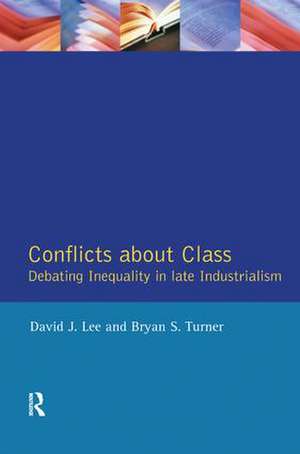Conflicts About Class: Debating Inequality in Late Industrialism
Autor David J. Lee, Bryan S. Turneren Limba Engleză Hardback – 19 ian 2017
| Toate formatele și edițiile | Preț | Express |
|---|---|---|
| Paperback (1) | 470.15 lei 6-8 săpt. | |
| Taylor & Francis – 3 apr 1996 | 470.15 lei 6-8 săpt. | |
| Hardback (1) | 625.03 lei 6-8 săpt. | |
| Taylor & Francis – 19 ian 2017 | 625.03 lei 6-8 săpt. |
Preț: 625.03 lei
Preț vechi: 985.02 lei
-37% Nou
Puncte Express: 938
Preț estimativ în valută:
119.60€ • 124.87$ • 98.98£
119.60€ • 124.87$ • 98.98£
Carte tipărită la comandă
Livrare economică 04-18 aprilie
Preluare comenzi: 021 569.72.76
Specificații
ISBN-13: 9781138161870
ISBN-10: 113816187X
Pagini: 316
Dimensiuni: 156 x 234 mm
Greutate: 0.45 kg
Ediția:1
Editura: Taylor & Francis
Colecția Routledge
Locul publicării:Oxford, United Kingdom
ISBN-10: 113816187X
Pagini: 316
Dimensiuni: 156 x 234 mm
Greutate: 0.45 kg
Ediția:1
Editura: Taylor & Francis
Colecția Routledge
Locul publicării:Oxford, United Kingdom
Cuprins
Part 1 1. Class in a Post Communist World 2. Has Class Analysis a Future 3. Are Social Classes Dying 4. The Persistence of Classes in Post-industrial Societies 5. The Dying of Class of a Marxist Class Theory 6. Succession in the Stratification System Part 2 7. British Sociology and Class Analysis 8. Is the Emperor Naked? 9. The Promising Future of Class Analysis 10. A Reply to Goldthorpe and Marshall 11. Gender and Class Analysis 12. Class Analysis: Back to the Future Part 3 13. Researching Class 14. Class in Britain since 1979 15. Patterns of Capitalist Development 16. Comparative Studies in Class Structure 17. Classes, Underclasses and the Labour Market 18. Class and Politics in Advanced Industrial Societies 19. Class Inequalities and Educational Reform in 20th Century Britain 20. Social Class and Interest Formulation in Post-communist Societies.
Descriere
In recent years there has been growing debate among sociologists about the concept of class and its relevance to the highly industrialised world of the late twentieth century. This book makes available in a single volume all of the key contributions to this debate and takes it a step further with a number of specially commissioned pieces. An editorial introduction which sets the main arguments in context, additional commentary and two alternative conclusions help to make this a unique text for a subject that remains crucial yet highly contentious.














